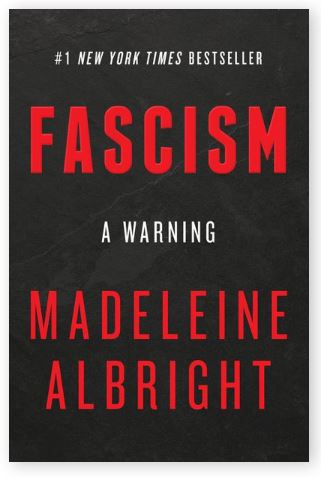I recall seeing former Secretary of State Madeleine Albright on various talk shows promoting this book. Once I decided to use the public library during my stay in Alabama, this book was at the top of my list – especially after reading Prague Winter a few months earlier.
 Fascism: A Warning was not available on my first trip to the library, so that’s when I read Albright’s The Mighty and the Almighty: Reflections on America, God and World Affairs. Not long thereafter, I reserved the book I wanted.
Fascism: A Warning was not available on my first trip to the library, so that’s when I read Albright’s The Mighty and the Almighty: Reflections on America, God and World Affairs. Not long thereafter, I reserved the book I wanted.
Published by Harper-Collins in 2018, Fascism: A Warning contains 254 pages within 17 chapters, plus acknowledgments, endnotes, bibliography, and an index.
Throughout the book, she shares her personal experiences with Fascism that started as a child during WWII in her native Czechoslovakia – a country for who her father served as a diplomat – a country with a proud democracy – a country later controlled by Nazis – a country that would become part of the Communist bloc – a country that would regain democracy as part of the Velvet Revolution in late 1989.
Her personal history involves being born in Czechoslovakia, living in Serbia, living in exile in England during WWII, returning to Czechoslovakia, and fleeing to the United States. Reading Prague Winter helped me understand life during the 1930s and 1940s – as well as the loss of family members in the Holocaust.
To introduce the topic (Fascism), Albright shares discussions with and thoughts by students in her classes at Georgetown University. Because of my past-life as a teacher, I know the importance of this by dealing with prior knowledge and misconceptions very early in the learning process. Her definition of a Fascist is the following:
Fascist: Someone who claims to speak for a whole nation or group, someone who is utterly unconcerned with the Rights of others, and is willing to use violence and whatever means are necessary to achieve the goals he or she might have.
After the introduction, the next four chapters center around Adolf Hitler (Germany) and Benito Mussolini (Italy) – their rise to power, their styles, their relationship, and their demise. General Francisco Franco (Spain) is embedded. If you recall this post past I did as a Final Jeopardy question (about Fascism), I based the list primarily on the first five chapters of this book.
The Chapters 6-14 focuses on past leaders as Joseph Stalin (USSR) and Slobodan Milosevic (former Yugoslavia); plus modern leaders as Hugo Chavez & Nicolas Maduro (Venezuela) with past leaders Juan & Eva Peron (Argentina) and Rodrigo Duterte (Philippines) are integrated into the chapter. Vladimir Putin (Russia), Recep Tayyip Erdogan (Turkey), Viktor Orban (Hungary), and the three generations of Kims in North Korea (DPRK) have dedicated chapters. Jaroslav Kaczynski (Poland) is integrated in the chapter about Hungary.
While a separate chapter focuses on President Trump, different US Presidents (starting with FDR) appear throughout the book. Madeleine Albright is perfectly clear that she is not a fan of President Trump, his agenda, and his tactics. She continues to believe in the strong light of liberty and democracy along with having a strong faith in the United States. (For the record, President Trump has praised at least four of the leaders listed in the previous paragraph.)
Chapter 16 examines if Fascism could become dominant in the US. After all, aspects of US history have events paralleling Europe. For instance, a Nazi movement in the US existed in the 1930s and 1940s.
In Chapter 17 (the final chapter), Albright focuses on connecting the dots by looking at the present world through the lens of the past and her experiences as a diplomat and a human. She unquestionably sees the growth in modern-day Fascism as a threat to international peace.
This is the third book I’ve read by Madeleine Albright, and like the others, it’s an easy read and meant for the general public. As with her other books, the reader’s political view will impact her words and their conclusions. Bill Woodward co-authors all three books with Albright.
For me, this book has a scary side – but I also see a hope. Then again, humanity as a way of not learning from its mistakes. Thumbs up to Fascism: A Warning.
